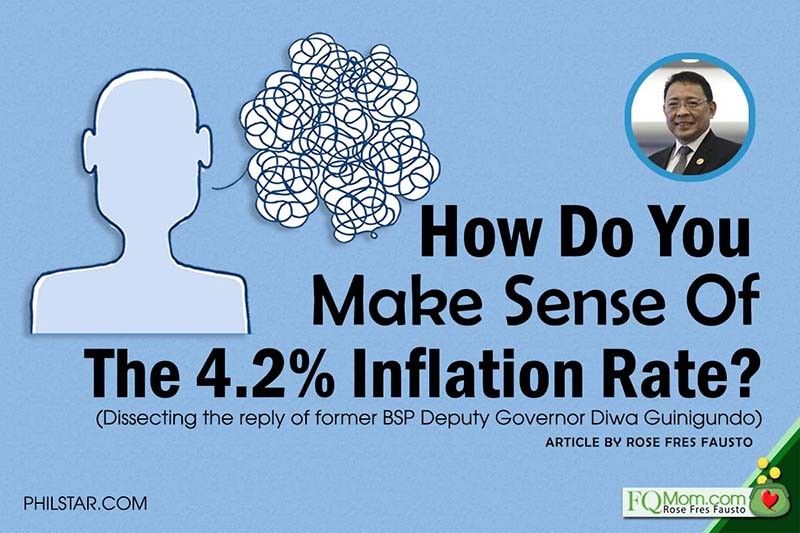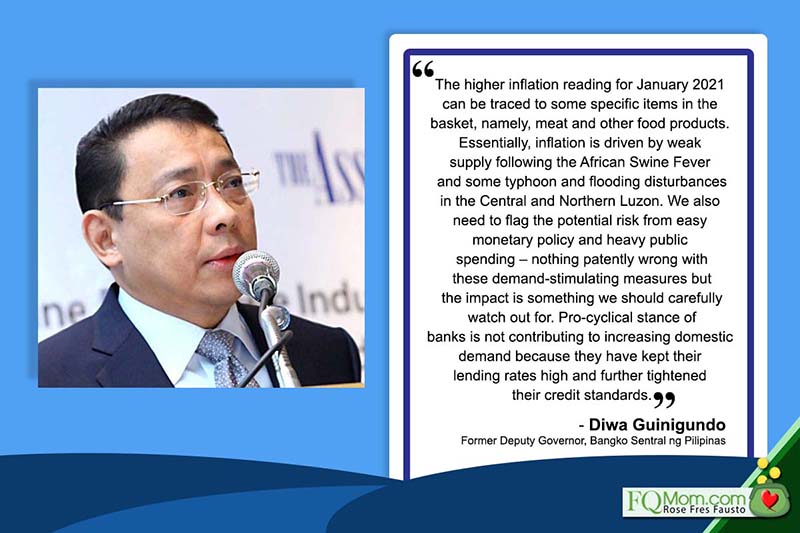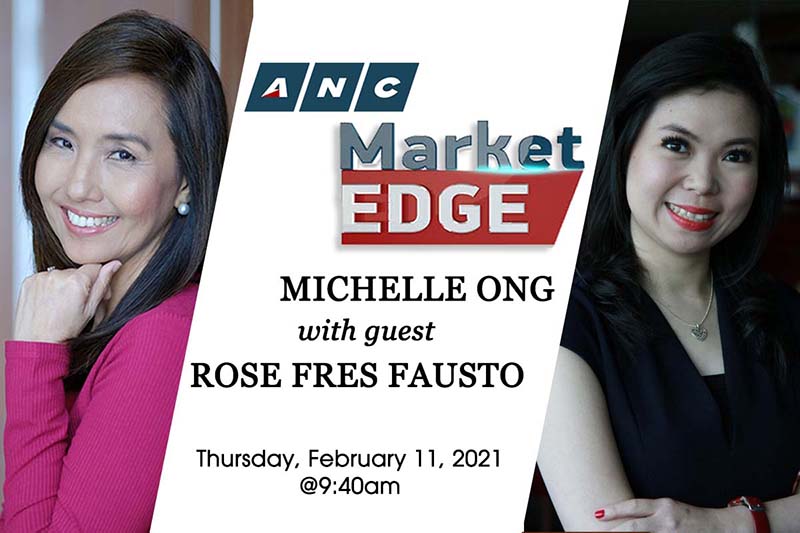How do you make sense of 4.2% inflation rate?


Dissecting the reply of former BSP Deputy Gov. Diwa Guinigundo
Last Friday, the latest inflation rate was announced and it was higher than expected. It was recorded at 4.2%. I asked former Deputy Gov. Diwa Guinigundo about his take on it. Before I tell you his answer, let me say something about him.
Diwa Guinigundo retired as deputy governor of the Bangko Sentral ng Pilipinas in 2019. He was a central banker for 41 years. His leadership was not only recognized locally as assistant governor for monetary policy but also internationally as he was the alternate director at the International Monetary Fund in Washington, DC, and was also the head of research at the Southeast Asian Central Banks (SEACEN) Centre in Kuala Lumpur. Back home, he pioneered inflation targeting as the BSP’s analytical framework for monetary policy in 2002. He was also the moving force behind the BSP’s advocacy for economic and financial literacy to help the poor manage their finances and address the issue of poverty. These are only some of the many important work done by Diwa during his 41-year stint at the BSP. He graduated cum laude, at the top of his AB Economics class at the University of the Philippines School of Economics. He earned his M.Sc. degree in Economics at the London School of Economics as a central bank scholar.
My quick question was, “What is your take on the recently announced January inflation?” This was his quick reply:
The higher inflation reading for January 2021 can be traced to some specific items in the basket, namely, meat and other food products. Essentially, inflation is driven by weak supply following the African Swine Fever and some typhoon and flooding disturbances in the central and northern Luzon. We also need to flag the potential risk from easy monetary policy and heavy public spending – nothing patently wrong with these demand-stimulating measures but the impact is something we should carefully watch out for. Pro-cyclical stance of banks is not contributing to increasing domestic demand because they have kept their lending rates high and further tightened their credit standards.

I was going to share this on my social media channels last Friday. Then I decided otherwise because it might be a handful to take for the regular Juan and Juana? ![]()
So, let’s try to break down his answer into segments.
1. First, let’s state here that inflation is the general increase in the prices of goods and services. The 4.2% rate announced last Friday was higher than consensus projections including BSP’s target at 3.3 – 4.1%. Note that some of our neighboring countries experienced low or negative inflation due to the depressed demand during the pandemic. Singled out in Diwa’s reply as causes of the higher inflation rate are the African Swine Fever and some typhoon and flooding disturbances. All these caused our supply to go down, causing the prices to increase. I hope you still remember your law of supply and demand. Generally speaking, the lower the supply, the higher the price (of course, assuming there is demand for the commodity). The higher the demand, the higher the price (assuming there is no oversupply).
2. We need to flag the potential risk of easy monetary policy and heavy public spending.
First, let’s define those two terms. Easy monetary policy means allowing more cash into the banking system which is done by the BSP by lowering interest rates. Heavy public spending means increasing government spending. Both measures, as Diwa said, are not inherently wrong, especially because this time of the pandemic necessitates the government to help spur economic activities. However, all of these should be done with caution because both have inflationary effects. It’s a balancing act, so to speak.
3. Pro-cyclical stance of banks is not contributing to increasing domestic demand because they have kept their lending rates high and further tightened their credit standards.
What does pro-cyclical stance mean? Pro-cyclicality refers to the interactions between the financial system and the real economy which are mutually reinforcing. These interactions tend to amplify what’s happening in the business cycle. When Diwa said banks are being pro-cyclical, he meant that they are leaning with the business cycle – i.e the economy is on a downturn so their lending is also following the same direction. They are tightening credit standards and lending rates remain at relatively high levels. This, despite the BSP pumping in additional cash into the banking system (easy monetary policy discussed in no. 2) to spur economic activity.
Inasmuch as we can’t blame the banks for being prudent with their lending, Diwa views this pro-cyclical stance as a cause of further delay in our economic recovery.
What do all these mean to the regular Juan and Juana?
Tumataas ang bilihin, humihina ang kita!
Yup, that’s the short of it. We really have to brace ourselves. This does not mean that we all cry, “The sky is falling!” and start blaming the government for incompetence. Well, you can just do that in private if you need to release some steam, but get up and start planning and moving.
Did you notice a decline in goal-setting enthusiasm when we ushered in 2021? I did. It was nowhere like the feeling of optimistic fresh start when we welcomed 2020. Some say, “I still feel 2020.” Others say, “What’s the use of planning when a disaster like COVID can just wipe out everything?”
Well, I guess all the more we need some 2021 planning. But here’s a tweak I wish to suggest. Instead of being so focused on that one thing you want to achieve in your 2021 checklist that assumes a certain set of parameters, plan your year with more scenarios. There are a million possible scenarios but choose just a few, maybe two major ones like scenario 1: We will continue to act as confined as we did in 2020 and scenario 2: We will gradually move more confidently as we get vaccinated or at least learn how to dance with the virus.
Planning does not mean being rigid. Planning is articulating clearly what you want to achieve and being flexible. Come up with targets for these two scenarios. How will you set your target income for 1 and 2? What are your corresponding expenses for 1 and 2? What work do you need to do for both? What preparations are in order so you are ahead whichever scenario materializes. Invest in yourself all the time. Read good books. One book I’m reading right now is “Think Again” by Adam Grant, one of our family’s favorite authors who also wrote “Give and Take, and Originals.” You may also wish to read the second installment of the “FQ Trilogy, Why Financial Education Alone Does Not Work (a crash course in Behavioral Economics)” if you want to master the psychology of money. (See below for details.)
We’re already in the second month of 2021 but planning the year is not yet too late. Chinese New Year is yet to come, so let’s make use of that fresh start optimism the year of the ox brings in this Friday. Gong xi fa cai!
**************************
ANNOUNCEMENTS
1. Watch me tomorrow at ANC’s Market Edge.

2. Be among the first to read FQ Book 2 before its launch! This is a product of my years of studying, writing, rewriting, some more writing and rewriting. To get your copy click: https://fqmom.com/bookstore/.

To know more about FQ Book 2, watch this short video.
3. My sons Martin and I will be holding the first of a series of FQ workshops for a major corporation who wants to enhance their manpower wellbeing through financial coaching. If you’re interested to have FQ workshop with your company, family, civic or other kind of group, please contact us at FQTeam@FQMom.com.

4. How good are you with money? Do you want to know your FQ score? Take the FQ test and map out your 2021 FQ plan. Scan the QR code or click the link: http://fqmom.com/dev-fqtest/app/#/questionnaire Insert FQ Test poster




















